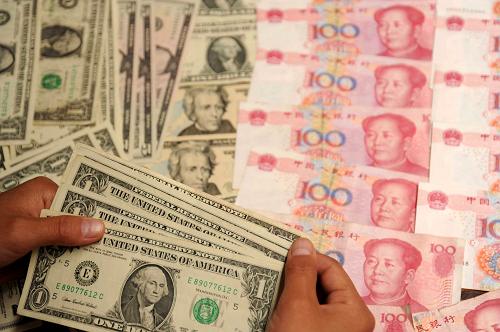Pressure mounts for yuan's depreciation in near future
- By Yi Xianrong
 0 Comment(s)
0 Comment(s) Print
Print E-mail China.org.cn, August 1, 2015
E-mail China.org.cn, August 1, 2015
|
|
|
The downward economic pressure and the changing international financial market have led China's business sector as well as the public to anticipate a yuan depreciation in the second half of the year. [Xinhua photo] |
The Chinese yuan's exchange rate against the U.S. dollar has largely remained stable at one dollar equaling 6.2 yuan. But the yuan will possibly suffer depreciation in the second half of the year due to the following three aspects.
First, the recent plunge of the Shanghai Composite Index (A Share) and the subsequent government efforts to bail out the stock market will have a major impact on the domestic financial market, along with its ongoing reform process. The possible modification of financial policies will surely influence the exchange rate.
Second, the U.S. Federal Reserve will likely raise bank rates, a move usually in conflict with the monetary policies of other major countries and posing severe risks.
The monetary and capital markets in the emerging economies are losing their previous momentum, so that the imminent U.S. rate hike will adversely influence their financial markets; a ripple will also be felt in other major financial markets worldwide.
Major commodities' prices have plummeted recently in an advance response to the U.S. rate hike. Facing the plunging prices of gold and crude oil, the Chinese government has been modifying its policies accordingly, in order to be prepared for undesirable developments in the second half of the year. In these policy changes, the policy on the yuan's exchange rate will be underscored.
In a memo issued by the State Council's executive office on July 24, the central government required the yuan's exchange rate to be kept at a "reasonable and balanced level," apart from perfecting the marketization of the yuan's exchange rate, and widening its fluctuation range. The memo also stressed the importance of further facilitating the yuan's cross-border settlement and increasing the scale.
In the latest policy change, the central bank has widened the fluctuation range to 2 percent, double the previous level. If the range is widened to 3 percent, exchange rate flexibility will be further strengthened. Such flexibility will release some of the depreciating pressure felt by the yuan, which in turn will boost China's exports.
The downward economic pressure and the changing international financial market have led China's business sector as well as the public to anticipate a yuan depreciation in the second half of the year. Policy changes related to exchange rate flexibility will reinforce such anticipation.
The author is a columnist with China.org.cn. For more information please visit: http://china.org.cn/opinion/yixianrong.htm
The article was translated by Chen Boyuan. Its original version was published in Chinese.
Opinion articles reflect the views of their authors only, and not necessarily those of China.org.cn.






